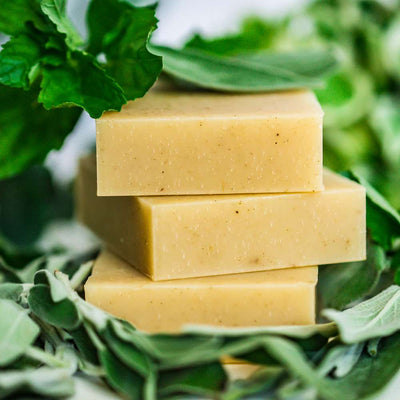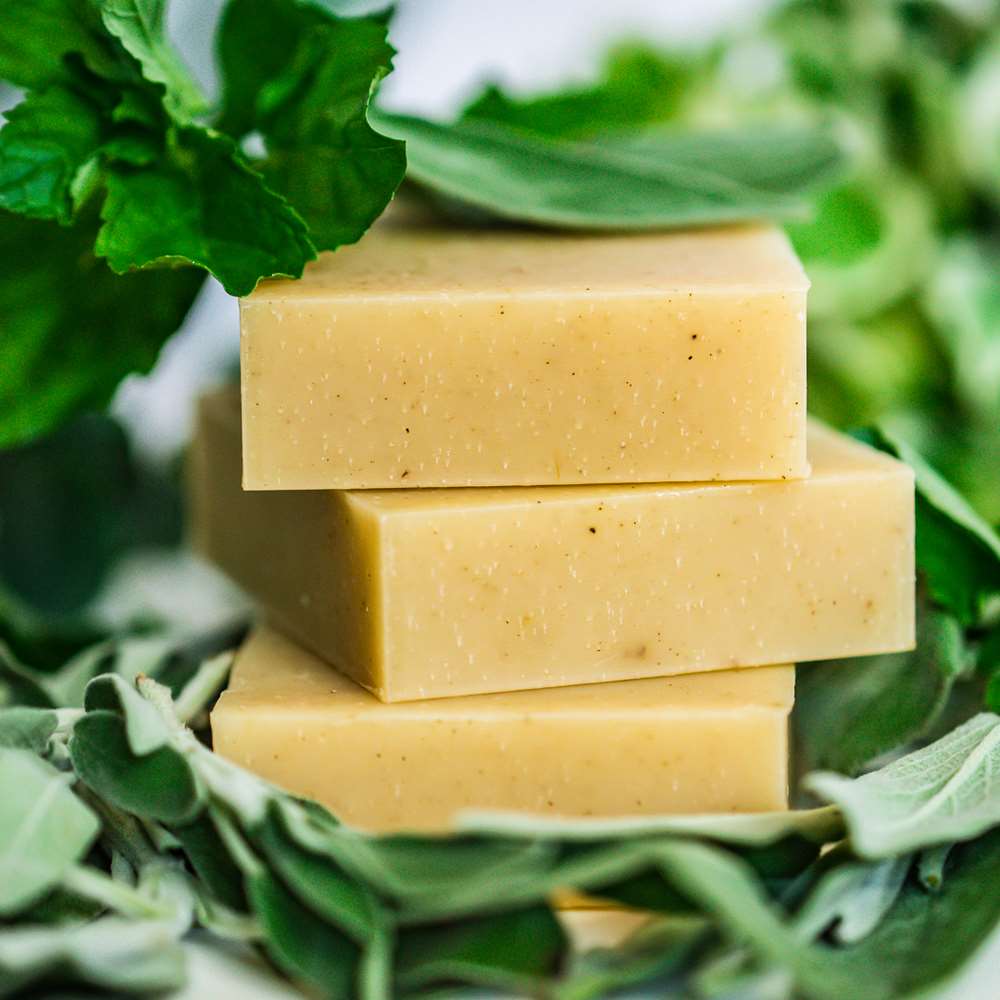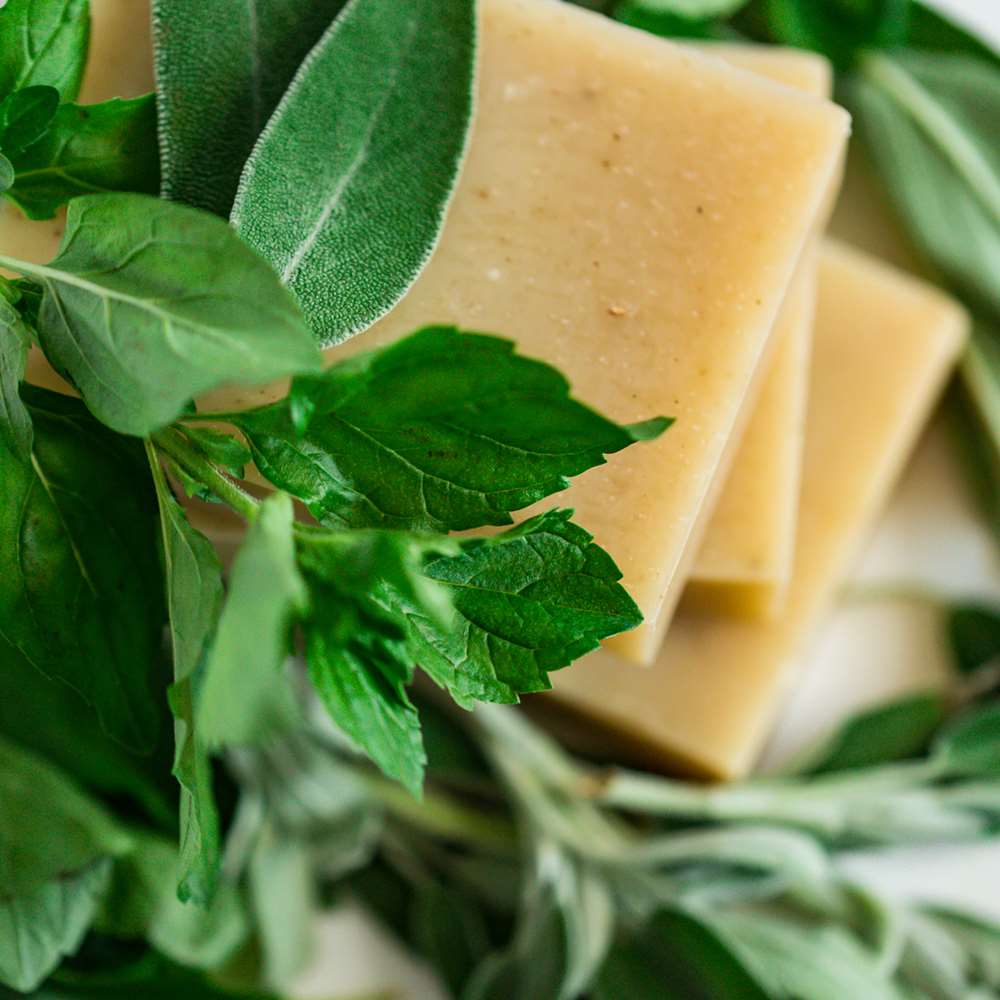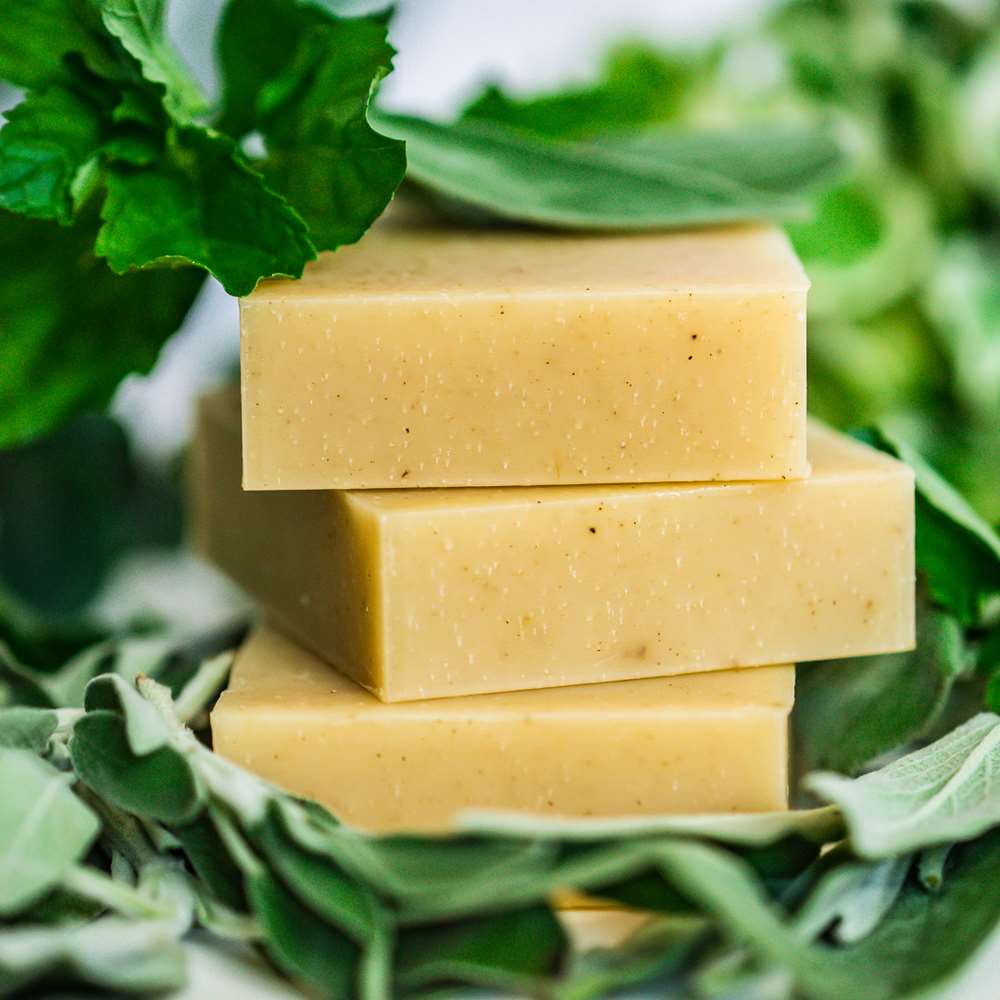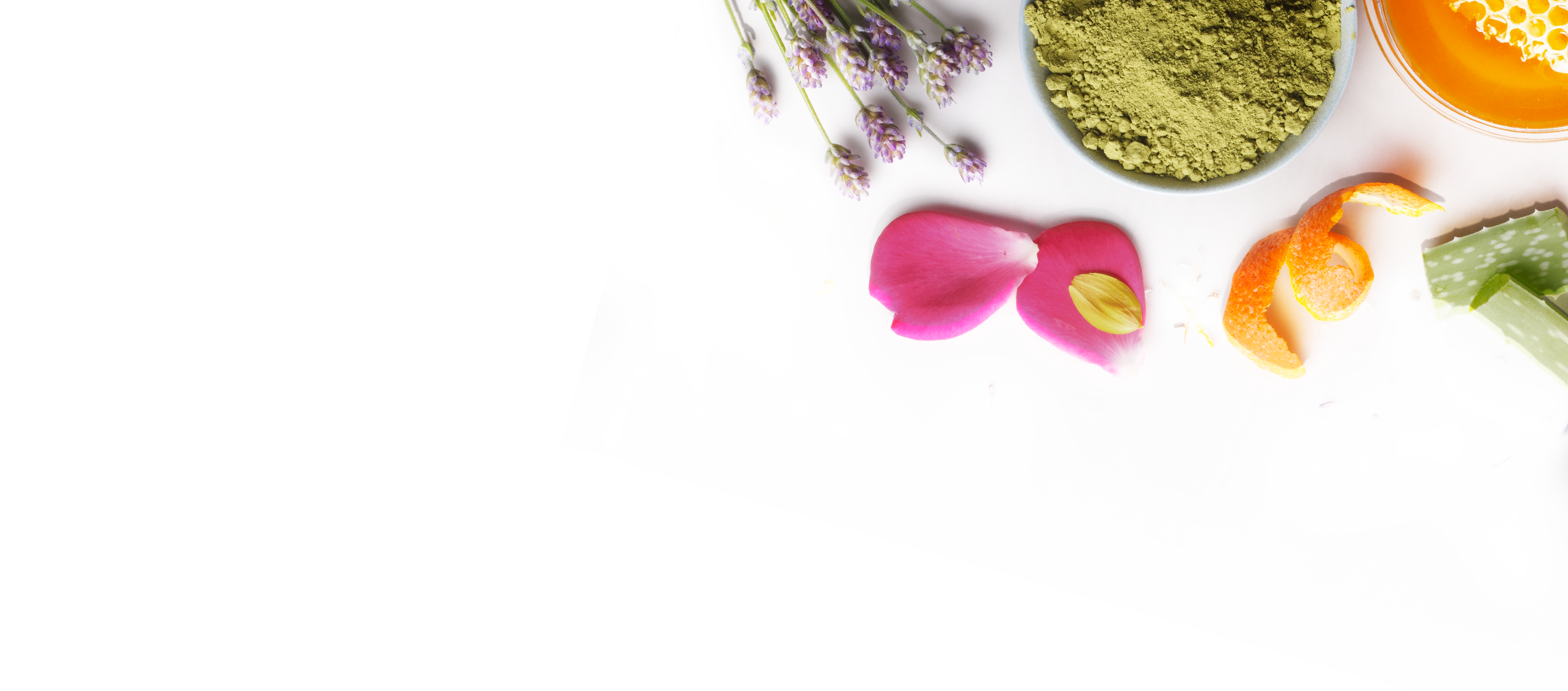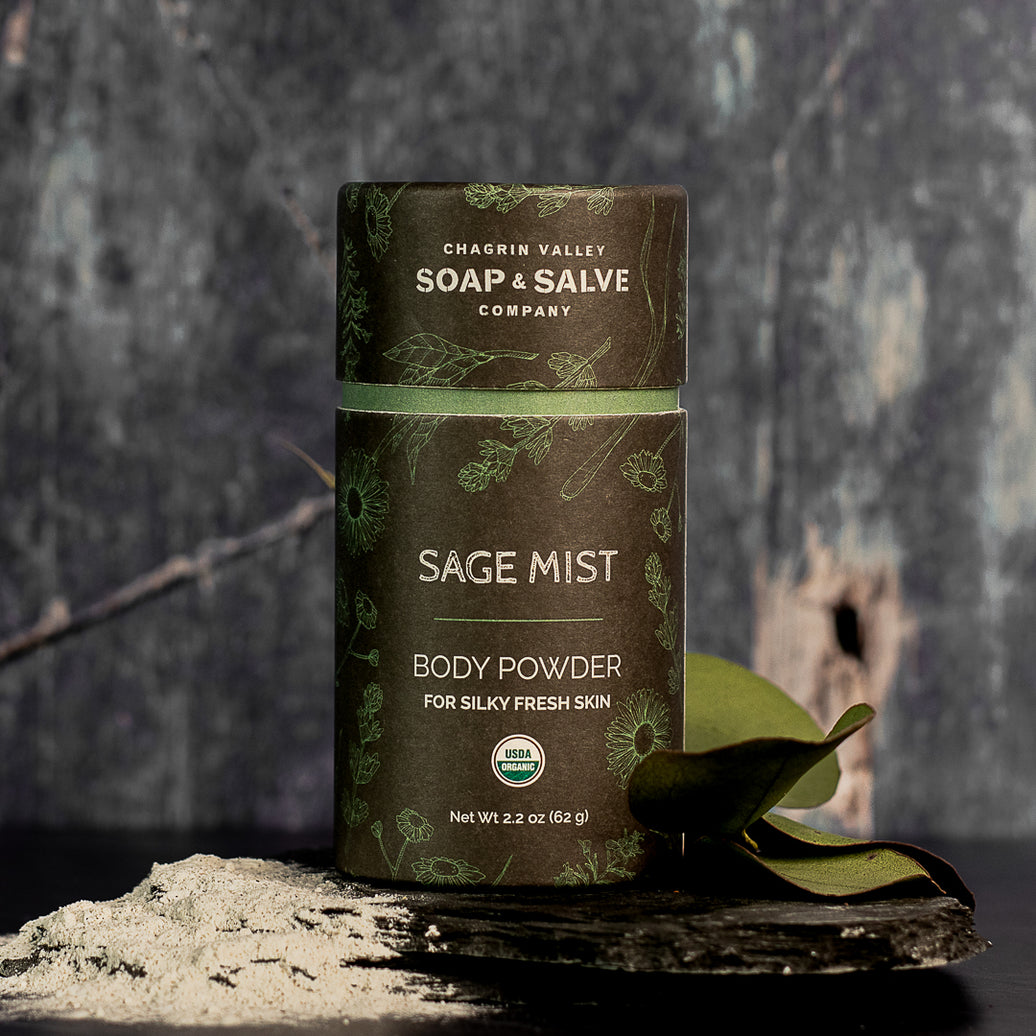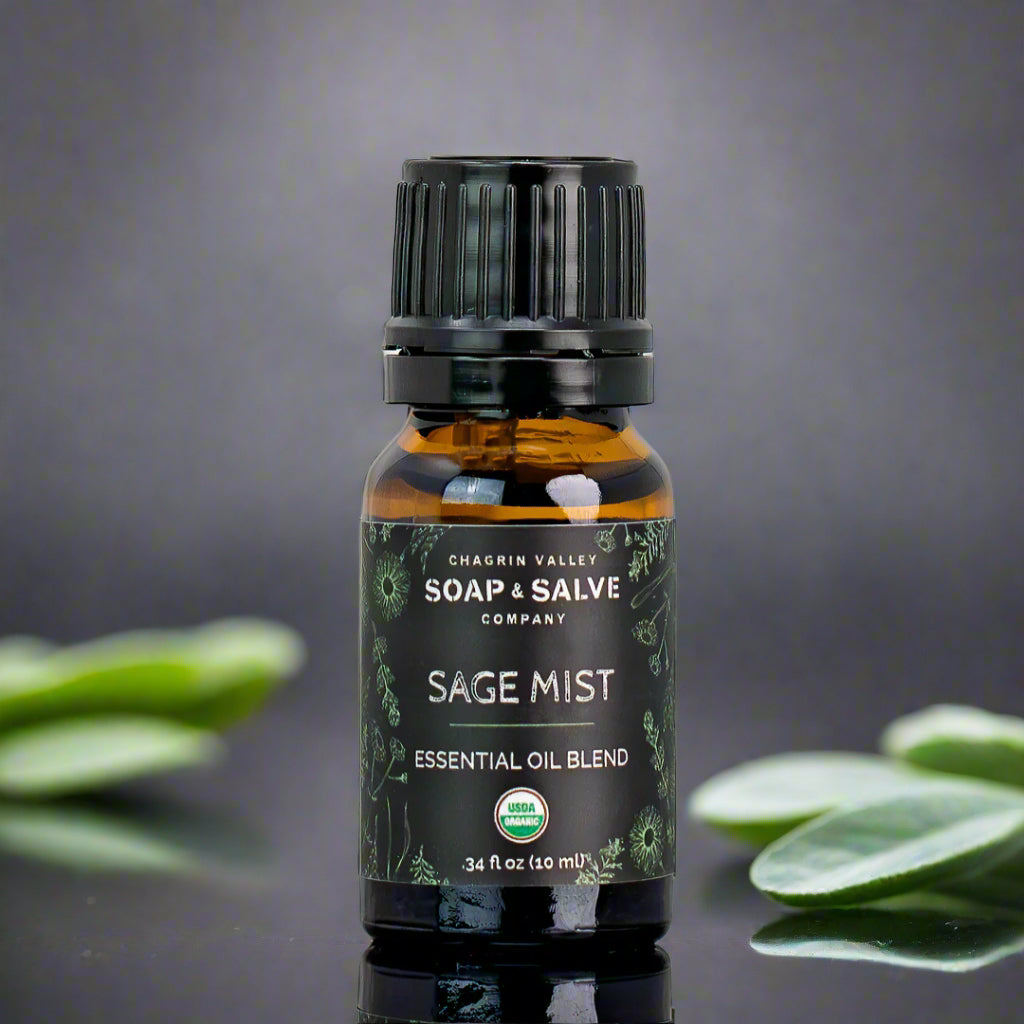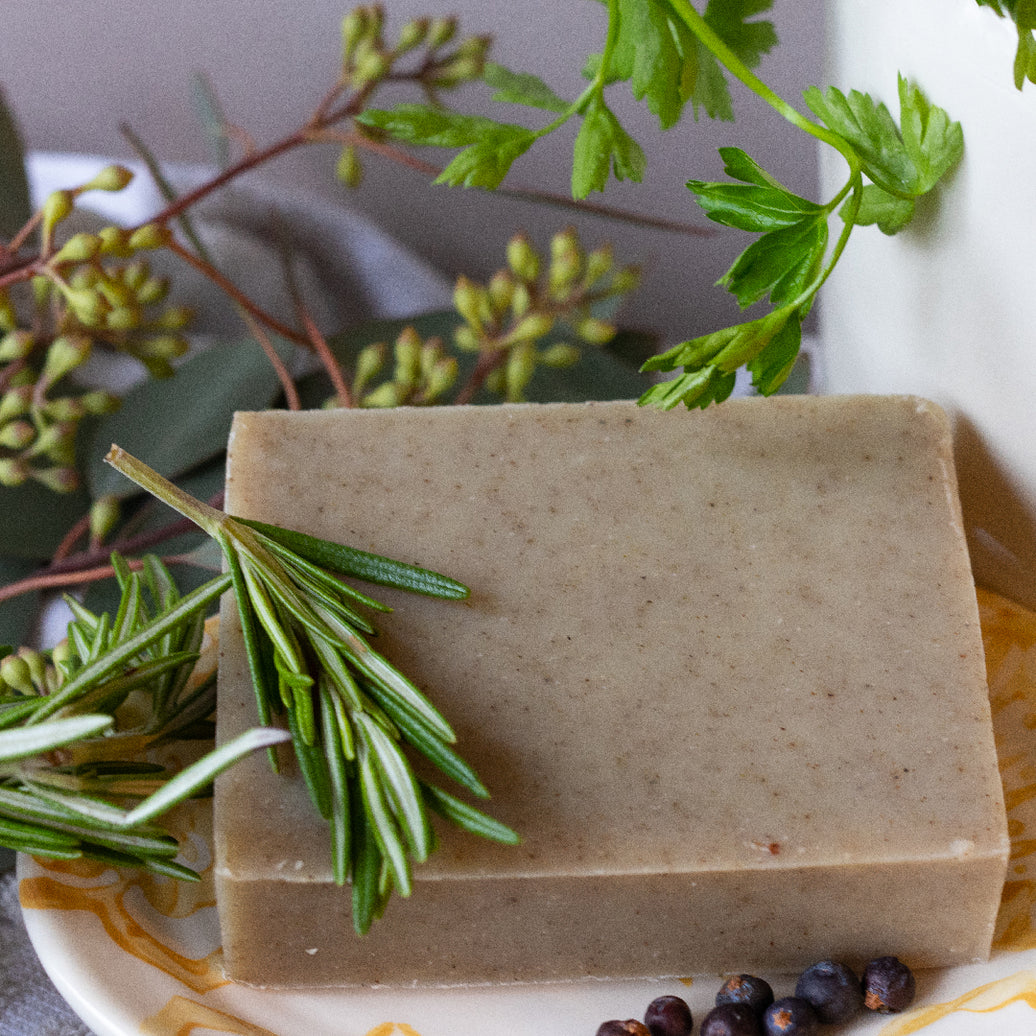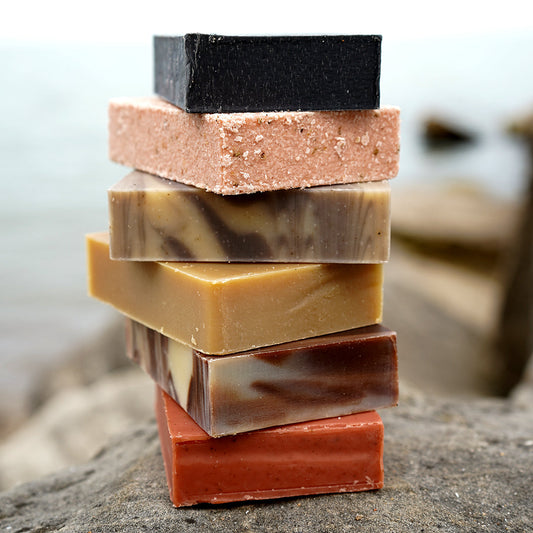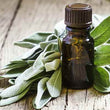
Natural Soap: Sage Mist
Natural Soap: Sage Mist
A moisturizing, natural body and complexion soap made with nourishing plant oils and enriched with soothing coconut milk and nourishing shea butter. The beautifully balanced essential oil blend, reminiscent of a fresh, cool spring morning, helps revitalize a fatigued mind and body.
- Out Of Stock






Product Overview
Good For: All Skin Types
A delightful body and face soap infused with an essential oil blend that combines the earthy, warm aromatic notes of sage and clary sage, the sweet and soothing floral scents of lavender and ylang ylang, the invigorating aromas of myrtle, peppermint, and eucalyptus, and then a hint of spicy fennel. Together, these oils create a harmonious blend evoking the freshness of a spring morning, which may help to uplift and relax the mind and body.
This dreamy, creamy natural soap is made with nourishing plant oils and enriched with shea butter and coconut milk.
Rich and creamy unrefined Shea Butter, known for its moisturizing properties, is a delight for the skin! It nourishes and hydrates, soothes and calms dryness, enhances skin's natural radiance, and leaves skin feeling velvety smooth with well-moisturized skin appearance.
Sunflower Seed Oil, rich in nutrients, is a highly moisturizing vegetable oil. It may help soothe and calm dry, sensitive skin, while also supporting the skin's natural moisture barrier to keep it soft, supple, and hydrated.
Coconut milk, rich in fat, does more than just moisturize. Its soothing properties may help comfort sensitive skin and alleviate dryness and discomfort associated with irritated skin leaving skin feeling soft and supple. In soap, it creates a silky, rich, and creamy lather.
How To Use
What Should I Use With My Natural Soap to Clean My Body?
 The purpose of soap is to combine with oil and dirt on the body, which allows water to wash it away. The method you use to cleanse your skin is really a personal preference. We thought we would share just a few examples.
The purpose of soap is to combine with oil and dirt on the body, which allows water to wash it away. The method you use to cleanse your skin is really a personal preference. We thought we would share just a few examples.
Bar Bathers rub the bar directly on their skin to create a creamy lather. Massaging the velvety lather into your skin before rinsing allows you to experience the best moisturizing properties of the soap. This is definitely the best way to use exfoliating soaps.
Hand Latherers create lather in their clean hands and use the lather to massage and wash the skin. This gentle, mild cleansing method may be good for those with sensitive skin.
 Washcloth Washers use a washcloth to lather up. Washcloths are made out of lots of different textile textures, from soft cotton to agave fibers, and can provide very gentle to intense exfoliation. Be sure washcloths are laundered and dried often.
Washcloth Washers use a washcloth to lather up. Washcloths are made out of lots of different textile textures, from soft cotton to agave fibers, and can provide very gentle to intense exfoliation. Be sure washcloths are laundered and dried often.
Puff Polishers use a mesh puff that works up a foamy, bubbly lather, even with hard water, to wash and gently exfoliate the skin. Poofs make natural soap last longer but can harbor bacteria, so rinse thoroughly after use and replace every few weeks or clean per manufacturer's instructions.
Loofah Latherers love their loofahs that exfoliate and help increase circulation. Whole loofahs can be breeding grounds for bacteria, so be sure they dry out properly after use and replace them every two months. If you would like something less abrasive, check out our Bath & Body Accessories.
Soap Sackers place their soap into a nylon soap bag. The fibers have a smooth texture for gentle cleansing. Soap sacks can be used for whole bars of soap or scraps that would normally be thrown away.
There is a large variety of bathing accessories available. If using any accessory, never share them with others and replace or clean them often.
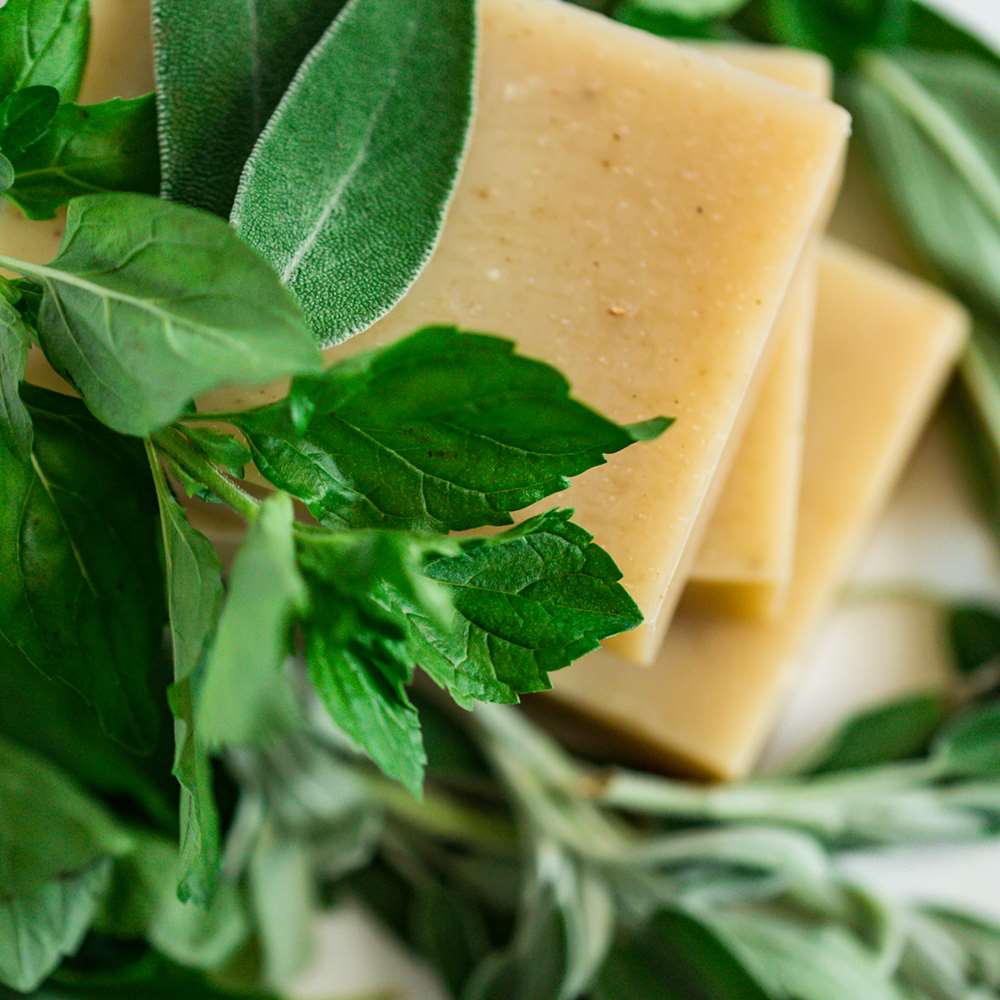
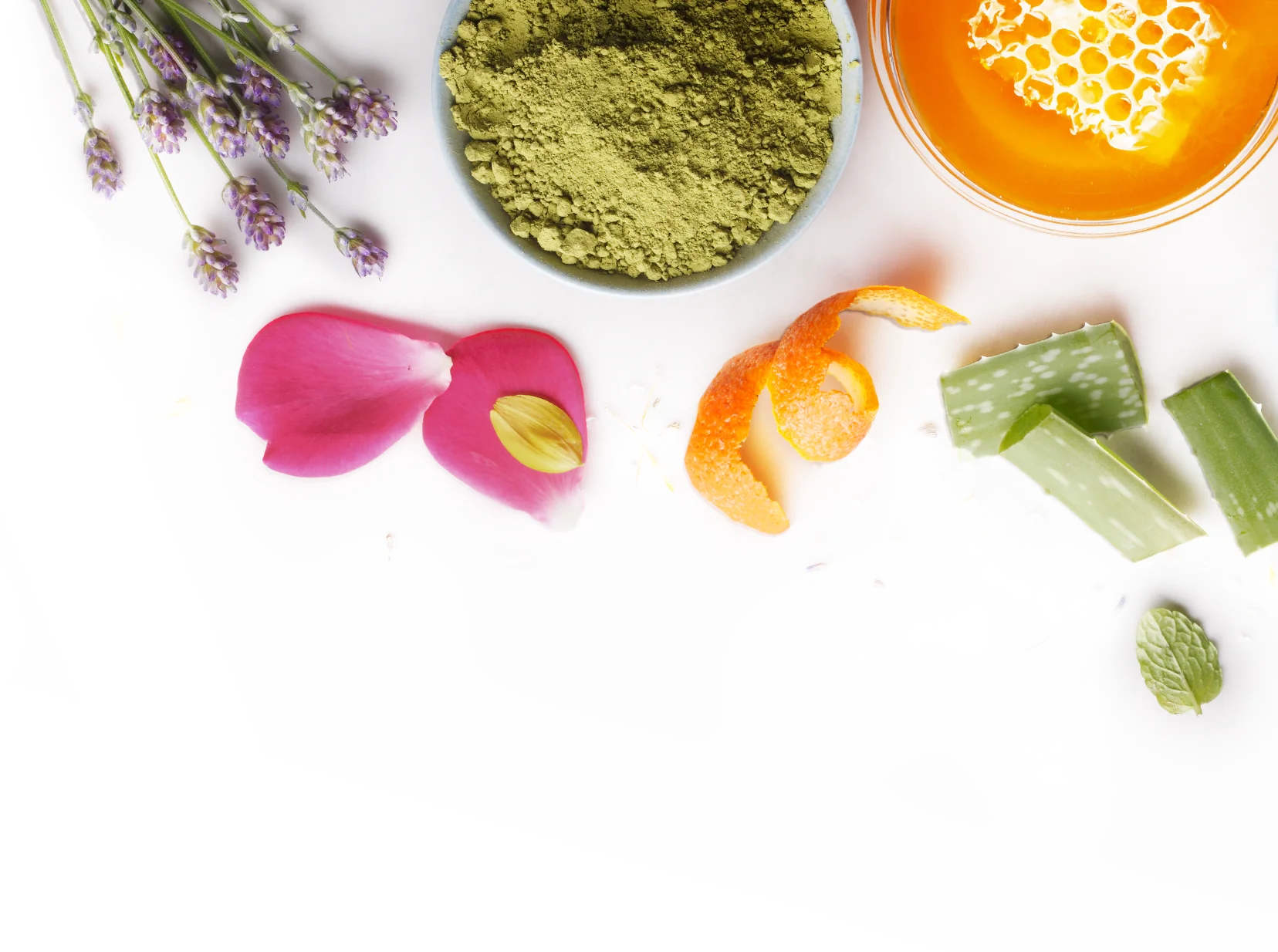
Effective, Feel Good Ingredients
The goal is simple: to Harness the Power & Simplicity of Nature® to cleanse, soothe, heal, and protect your skin and hair!
Our unique formulas rely on moisturizing oils and butters, healing botanicals, and pure essential oils. We choose every ingredient with one end-result in mind….the BEST possible natural skin care for YOU!
Featured Ingredients

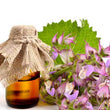
Organic Clary Sage Essential Oil
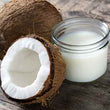
Organic Coconut Milk
All Ingredients:
|
*Ingredient is Fair Trade Certified ^Used in the saponification process to turn oil into soap and glycerin. None remains in the finished product.
Made with certified organic Flaxseed Oil, Shea Butter & Coconut Milk
|
Frequently Asked Questions
What is My Skin Type?
Your skin is as unique as you are.
If you think about it, your skin type is not even the same for all of the areas of your body.
The skin on your face is different from the skin on your hands, which is different from the skin on your back which is different from the skin on your feet ...etc.
Although your skin type is determined by genetics, it will also be affected by other factors and can change with time.
Understanding your skin type is a good starting point before trying or switching to natural products.
There are typically five types of healthy skin: normal, dry, oily, combination, and sensitive.
NORMAL SKIN
This skin is balanced, neither too dry nor too oily. It has regular texture, no imperfections and a clean, soft appearance, and does not need special care.
OILY SKIN
Oily skin is the result of excessive secretions of sebum, an oily secretion of the sebaceous glands. Oily skin tends to attract more dirt and dust than dry skin and may be prone to blackheads, acne, and excessive shine. It is frequent in adolescents and often seen with acne or blemish-prone skin.
DRY SKIN
For some people dry skin is caused by external factors such as the weather, low air humidity, sun, or hot showers, and it is often temporary.
However, for others it may be a lifelong condition. Dry skin is a result of a decrease in natural oil production which often results in skin that is flaky and has a rough appearance. Dry, cracked skin is often prone to skin disorders, such as eczema.
 SENSITIVE SKIN
SENSITIVE SKIN
Truly sensitive skin easily reacts to external stimuli. The skin is often fragile, thin or fine-textured, dry, and prone to allergic reactions.
Sensitive skin often feels uncomfortable, tight, red or itchy. It is a delicate skin that needs a lot of TLC.
COMBINATION SKIN
Combination skin is just what is sounds like, it has characteristics of both dry and oily skin. The area with more oil is usually the T- zone (forehead, nose, and chin), while the skin on the cheeks is normal or dry.
For more information on skin type and help with product recommendations for your individual needs, please read our blog, What's Your Skin Type?
View Answer Page
12 Reasons to Use Handmade Natural Soap
After all these years in business, the most often asked question we hear remains, “Why is natural soap better?”
I have been using only natural soap on my face and body for over 20 years. It is the first product I learned to make.

My skin has become so accustomed to the benefits of these lovely bars, that everything else makes my skin itch.
Our soap bars travel with me everywhere I go. I even keep one-time-use scraps in my purse to use in public restrooms!
While I believe that many of the "reasons" listed below may apply to some natural handmade soap companies, I will focus on the one company with which I have intimate knowledge and experience--CHAGRIN VALLEY.
1. Handmade Soap is Actually Soap
Most of the soap you purchase today is a commercially manufactured chemical cocktail of ingredients. It is not natural and is not even really “soap.” They are nothing more than detergents in disguise.
Here is what the FDA has to say:
“Today there are very few true soaps on the market. Most body cleansers, both liquid and solid, are actually synthetic detergent products. Detergent cleansers are popular because they make suds easily in water and don't form gummy deposits. Some of these detergent products are actually marketed as "soap" but are not true soap according to the regulatory definition of the word.” Source
2. Natural Soap is Made With Natural Ingredients
The very best reason to use natural soap is the ingredients. A product is only as good as the ingredients used to make it.
OUR skin-nourishing ingredients are USDA Certified Organic, sustainably produced, cruelty-free, and ethically traded.
Harnessing the Power of Nature we make each soap bar unique by adding a variety of organic butters, purifying natural clays, organic herbs, seeds, grains, spices, flowers, vegetables, fruits, chocolate, and pure botanical essential oils to provide natural color, aromatherapy, texture, and gentle exfoliation.
3. Natural Soap Is NOT Made With...
- synthetic ingredients
- artificial fragrances or perfumes
- artificial colors
- detergents
- synthetic preservatives
Our soap bars contain only the ingredients that they need—no extra preservatives that liquid body washes or commercial bar "soaps" require to increase their shelf life to years, and no foam boosters to make them lather.
4. Natural Soaps Are Moisturizing

Sadly many people have the misguided perception that all bar soaps will dry your skin. The problem is that most commercial bar “soaps” are detergents and not real soap.
So why are natural soaps so moisturizing? Of course, it's the ingredients! Natural soap made of pure ingredients derived directly from nature is a rare find these days. Here are a few other reasons.
Superfatting
Superfatting is the process of adding extra fats (oils or butters) when formulating a soap recipe so there is more fat in the mixture than the lye can react with during the chemical reaction. This process creates a more hydrating bar with superior moisturizing and emollient qualities.
Our soap bars are formulated with lots of extra plant oils and butters. We superfat our bars at a higher rate than most soapmakers.
Natural Glycerin
Glycerin is not added to a natural handmade soap recipe – it is created during the natural soap making process called saponification. Once saponification is complete, the ingredients have combined and chemically changed into soap, glycerin, and a bit of water.
Glycerin, a precious and gentle emollient, is a humectant that draws moisture from the air to the skin creating a moisturizing protective layer.
Commercial soap manufacturers remove the glycerin from their soaps because excess glycerin decreases the shelf-life of soap and they can sell the glycerin or use it in products that command a higher price like the lotion.
Think about it! Commercial soap companies remove the moisturizing ingredient (the glycerin) which in turn creates a soap that dries your skin and then they use the glycerin they removed to sell you a skin-moisturizing lotion. Quite an ingenious profit-making strategy!
Thus skin-nourishing ingredients, plus superfatting and natural saponification create a soap bar full of moisturizing, natural oils, and natural glycerin.
5. Scented Natural Soap Provides Real Aromatherapy
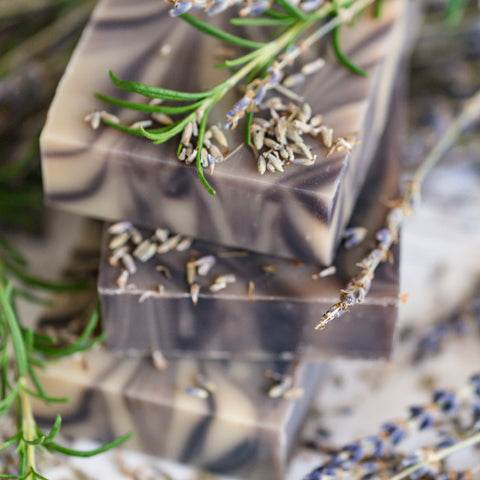
Our scented natural soaps are made with pure essential oils, not fragrance oils, and offer aromatherapeutic benefits.
Fragrance oils, whether artificially created or derived from natural components, may duplicate the smell of a flower or herb, but they do not offer the therapeutic advantages of essential oils.
Furthermore, the generic term, “fragrance” or “parfum” on a label can indicate the presence of up to 3,000 separate ingredients and the FDA does not require companies to disclose what is in a “fragrance,” because it is considered a “trade secret.”
BLOG: Why We Use Only Real Plant Essential Oils
6. Natural Soap Helps Maintain Healthy Skin
The body’s largest organ, our skin, is incredibly porous and absorbent. How we treat our skin can have a major impact on our overall health as well as the look and feel of our skin.
Everyone wants healthy skin and our skin is not a fan of synthetic chemicals. I cannot count how many times customers have told us that our natural soap has not only helped improve their skin but has improved their lives by relieving itchiness and dryness, and easing irritated skin conditions such as eczema and acne.
7. Natural Soap Provides Rich Lather Without Synthetic Foam Boosters
People absolutely love bubbly lather. The foam, bubbles, and lather we know and love from commercial liquid and bar soaps are produced by surfactants--synthetic foam boosters, lathering agents, and detergents.
A properly formulated and cured bar of natural soap needs no synthetic additives to create a lather or to clean because natural soap is a natural surfactant. So it not only makes great bubbles and lather, but it also helps clean oily dirt from your skin--naturally!
BLOG: "How Does Natural Soap Create Lather?"
8. Natural Soap is Economical
Some consumers are put off by the cost of handmade soap. You probably look at a bar of natural soap and wonder why it costs more. I mean, soap is soap, right? Both bars clean your skin, right?
While I may agree that both bars clean the skin, the similarity goes no further. Simply put, commercial soaps contain synthetic ingredients that are very cheap to produce in a lab.
If you use a liquid body wash the main ingredient is water. You pay for water. A properly cured soap bar has very little water remaining, meaning you are getting exactly what you pay for.
I believe that old saying, "You get what you pay for," rings true when comparing a handmade bar of a natural soap to a commercial brand!
BLOG: "The True Cost of Commercial Soap"
9. Natural Soap Has a Smaller Environmental Impact
It may seem odd that a product we use to keep our bodies clean is doing quite the opposite for our environment.
If you are not using a natural soap, as you take a bath or shower you coat your skin with synthetic compounds like fragrances, dyes, preservatives, and detergents. These synthetic ingredients wash down our drains into our septic fields or water treatment facilities. Now imagine the millions of people who use these soaps each day.
Also, if you use a liquid body wash, how many plastic bottles and pumps do you dispose of in a single year?
10. Natural Soaps are Unique

I make handmade natural soap. I did not invent anything new.
But what I know is that our natural soap is made in small batches by people who have a passion as well as a mission for making natural products.
For me, soapmaking is a synergy of science and art that took years to perfect. It is a labor of love. I take the time to create wholesome soap recipes that do not sacrifice beauty or scent while incorporating amazing natural and organic ingredients.
11. A Natural Soap Company Has Social Consciousness
While I am sure there are some large commercial soap companies with a social conscience, natural soapmakers tend to have the utmost respect for the earth and all its creatures.
Environmental stewardship is not a buzzword for us. It is not a talking point, not a political stance nor is it about optics!
At Chagrin Valley it is our practice to use raw materials that are sourced in an environmentally and ethically responsible manner.
- We use organic ingredients which supports organic farming
- We are Leaping Bunny Certified--Cruelty-Free
- Our palm oil and other ingredients are certified sustainable
- We buy Fair Trade whenever possible
- Our products are biodegradable and minimally packaged with recycled and recyclable materials
- Our packaging is over 99% plastic-free
- Our natural ingredients will not add synthetic chemicals to our ecosystems
Dedication to a kinder and gentler way of living is a big part of why we do what we do.
12. You Are Supporting A Small Business
 If you are holding this soap in your hand, I probably don't need to convince you that shopping small business is important. Your purchase really does make a difference.
If you are holding this soap in your hand, I probably don't need to convince you that shopping small business is important. Your purchase really does make a difference.
When you buy a handmade bar of natural soap, you are supporting a small business that truly cares about and believes in the products they make.
Small businesses are run by people - not by boards or stockholders. They are often entrepreneurs who bring a creative freshness into an otherwise regimented world.
We do it all ourselves--from start to finish--from our hands to your hands--from our family to yours! Thank you!
Before I conclude I would like to add one final reason to the question of "Why You Should Switch To Natural Soap Bars."
The simplest answer is, Why Not?
From its composition to its benefits for the skin and health, to its impact on the environment, natural soap is very different from commercial liquid “soap,” bar “soap,” or syndet bars.
View Answer Page
How To Wash Your Hands To Help Stay Healthy

Regular handwashing is one of the best ways to remove germs, avoid getting sick, and prevent the spread of germs to others.
The CDC (Centers for Disease Control and Prevention) says that for good hand hygiene all you need is plain soap and water.
Clean hands can stop germs from spreading from one person to another and throughout an entire community.
Five simple and effective steps can help reduce the spread of illness so you, your family, your friends and the general public can stay healthy.
Hand washing is a win for everyone . . . except for the germs!
CDC recommends cleaning hands in a specific way to avoid getting sick and spreading germs to others. The guidance for effective hand washing was developed based on data from a number of studies.
Wash often and follow these five steps every time you wash your hands!
1. Wet your hands with clean, warm running water and apply soap.
-
When dealing with cold and flu viruses, as you wash your hands the soap molecule burrows its way into the fatty envelope of a virus and literally pulls the virus apart.
2. Lather your hands by rubbing them together with the soap.
- Soap and friction help lift dirt, grease, and microbes—including disease-causing germs—from the skin so they can be rinsed down the drain.
- Lather the backs of your hands, between your fingers, and under your nails.
3. Scrub your hands for at least 20 seconds.
- Lathering and scrubbing hands creates friction, which helps lift dirt, grease, and microbes from skin.
- The entire hand should be scrubbed. Microbes are present on all of the wrinkly surfaces of the hand, especially under the nails.
- How long are 20 seconds? About the amount of time it takes to hum the “Happy Birthday” song from beginning to end twice.
- The ideal length of time for handwashing can depend on other factors for example, if hands are very dirty or if you are caring for someone is ill.
- Evidence suggests that washing hands for about 15-30 seconds removes more germs from hands than washing for shorter periods.
4. Rinse your hands well under clean, running water.
- If you are using a public restroom use a paper towel to turn off the faucet after hands have been rinsed.
5. Dry your hands using a clean towel or air dry them.
To date, studies have shown that there is no added health benefit for consumers (this does not include professionals in the healthcare setting) using soaps containing antibacterial ingredients compared with using plain soap.
Information is taken from the CDC.gov website
Read our blog "Simple Soap Can Help Decrease the Spread Of Viruses"
View Answer Page
Don't I need to use antibacterial soap to protect my family from germs?
The Short Answer
NO! Adding antibacterial chemicals to soap does not keep your family safe from germs.
I understand why folks (especially those with children) are choosing products labeled “Antibacterial,” hoping to keep their family safe in the war against germs.
According to Janet Woodcock, M.D., director of the FDA’s Center for Drug Evaluation and Research (CDER).
"Consumers may think antibacterial washes are more effective at preventing the spread of germs, but we have no scientific evidence that they are any better than plain soap and water.
In fact, some data suggests that antibacterial ingredients may do more harm than good over the long-term.”
Simply washing your hands with old-fashioned natural soap and water rids your skin of most fungi, bacteria, and viruses. Soap does not kill germs, it surrounds them and carries them away.
The Long Answer
Please read our blog: Antibacterials: More Harm Than Good!
View Answer Page
How Long Will A Bar of Natural Soap Last?
Short Answer
 How long a natural soap bar will last depends on:
How long a natural soap bar will last depends on:
- how many people are using it
- how often you bathe or shower
- how you use the bar
For one person showering every day, a well-drained bar should last for about one month.
Longer Answer
Natural soaps are normally softer than commercial soaps because they retain their natural glycerin (which is removed in commercial soap production) and contain no artificial hardening chemicals, synthetic waxes or free alkali.
We also superfat our soaps (add extra oils or butters) and use "softer" oils so that Chagrin Valley natural soaps are more emollient and leave skin feeling moisturized.
Different oils impart different qualities to soap. Some add lathering qualities, some moisturizing, some hardness, and so on. Compared to other natural bars, we use a larger percentage of extra moisturizing and conditioning oils in our soaps and shampoo bars. These oils produce a bar that may not be as hard as bars with less conditioning oils.
How you use the bar will also affect its lifespan. For example, do you use a washcloth, an exfoliating accessory, or only the bar? Although exfoliating loofahs and sponges are great they will use up the soap much faster than a washcloth or the "only the bar" purists.
Our Natural Soap Will Last A Long Time With Proper Care
- Don't let your soap sit in water
- Store soap on a well-drained soap dish
- Allow soap plenty of fresh air to dry between uses
- Never place soap where shower water can continuously hit it
- If your bar ever gets waterlogged and becomes gooey, simply set it on a draining soap dish or stand it on its edge for a few days and let it dry out thoroughly
Cute Story: A customer called to say she loved our soaps but could not buy them anymore because they did not last as long as other soaps. A week later she called to place an order and apologize. Her husband, who would NEVER use her natural soaps before, fell in love with her new Juniper soap . . . and he showered twice a day!
To maximize the life of your soap, keep it in a well-drained soap dish so it can dry between uses.
We sell a handcrafted solid white oak soap dish. The deep ridges are perfect for keeping your all natural handcrafted soap dry between uses. White Oak is the wood used in shipbuilding.
A tip passed on by one of our customers whose kids always leave the soap in a water puddle: cut the large bars in halves. Then alternate the halves, allowing a longer drying time between uses.
View Answer Page
Is Your Palm Oil From Plantations That Protect Our Rainforests?
We often receive emails from concerned customers that have read about the devastating effects that palm plantations can have on tropical forests.
At Chagrin Valley Soap we treasure our planet and its inhabitants. We know that although we play a very small part, we must always make choices that are ecologically and socially responsible.
As the global demand for palm oil continues to increase we want to be part of the global initiative that changes how that palm oil is grown.
Our Palm Oil is grown and manufactured according to standards for sustainable practices set forth by Palm Done Right.
Certified Sustainable
Certified sustainable by RSPO (The Roundtable on Sustainable Palm Oil) and Palm Done Right

Our USDA organic palm oil variety carries RSPO Certification, otherwise known as Roundtable on Sustainable Palm Oil, guaranteeing the sustainability and traceability of the palm oil production throughout the supply chain.
It has RSPO-IP (Identity Preserved) certification which is one of four certification levels offered by the RSPO and carries the highest and strongest level of sustainable guarantee with traceability of each lot of palm oil back to the field of origin. With Identify Preserved sustainable palm oil, the entire batch of palm oil is from a single identifiable certified source and kept separate from all non-certified batches.

Palm Done Right presents the first fully integrated, 100 percent organic supply chain in the palm oil industry. Palm Done Right requires a fair labor certification, organic certification, Non-GMO Project Verification, and has the highest level of certification — Identity Preserved — offered by the Roundtable for Sustainable Palm Oil (RSPO).
As the global demand for palm oil continues to increase, we believe that if both manufacturers and consumers demand Certified Sustainable palm oil, producers will grow Certified Sustainable palm oil. That is the only way to really protect our rainforests.
If there is no demand for sustainable palm oil, growers will continue their cheaper unsustainable practices, because no one is paying them for a sustainable product. (If you build it, they will come!)
Please read our blog, "Will A Palm Oil Boycott Really Help?"
View Answer Page
What are essential oils?
What Are Pure Essential Oils?
Have you ever enjoyed the scent of a fragrant flower or herb? The fragrance comes from potent, aromatic compounds called essential oils found in the flowers, stems, seeds, bark, roots, fruits, and other parts of plants. It often requires several pounds of a plant to produce a single bottle of essential oil.
Essential oils not only give plants their unique scents but also help lure plant pollinators and protect plants from insects and other predators.
The chemical composition of essential oils may provide valuable psychological and physical aromatherapeutic benefits for some people.
It is important to note that to be a true essential oil, the oil must be isolated from the plant material by physical means only. Essential oils are NEVER extracted using solvents.
Although synthetic fragrances or "nature identical" oils are available at a much lower cost, only natural plant essential oils will provide any aromatherapeutic benefits.

What Are Essential Oils (Much more detail)
How Essential Oils Are Extracted
Why We Use Only Real Plant Essential Oils?
If you are pregnant or under a doctor's care for any medical condition, please consult your healthcare provider before using essential oils.
Pregnancy & Children: We do not provide information on the safety of essential oils during Pregnancy or for use in Children because the available information is very ambiguous and often contradictory. If you’re interested in using essential oils during pregnancy or with young children please do your own research and consult your doctor, midwife, or health care professional before use.
View Answer Page
Why Does the Smell of Natural Soap and Shampoo Bars Made with Essential Oils Change?
My natural soap bar doesn't smell the same as the last one
We sometimes receive emails that go like this:
-
I just reordered [some soap]. It is my favorite bar but it does not smell the same. Did you change the recipe?
- This name of this bar is "lavender . . . " but I smell more of the other essential oils than lavender. Why do you call it lavender?
The good news is that when you purchase natural soap from an organic skincare company, it is scented with only pure essential oils.
The bad news is that when you purchase natural soap from an organic skincare company, it is scented with only pure essential oil.
The scent of an essential in any totally natural product can and will change over time and from batch to batch.
Essential Oils are a Natural Ingredient
Essential oils come from nature. The quality and scent of essential oils are affected by yearly weather conditions and varies from crop to crop and region to region.
This makes it very difficult to produce finished products in which the scents are always exactly the same.
Most commercial soaps (and skincare products), even some of the "natural" ones that contain some essential oils, are made with at least some synthetic fragrances oils, nature identical oil, or natural fragrance oil. Using any synthetic fragrance ensures a more consistent scent.
Essential oils are temperamental to work under any circumstance. But while a natural essential oil scent blend may change a bit in a cream or oil, these blends are especially unpredictable when making cold processed natural soap.
After all my years of soap making in never ceases to amaze me just how much the actual soap making process changes the scent of an essential oil blend.

Natural Soap and Essential Oils
Why We Use Only Real Plant Essential Oils?
Natural Fragrance Oil? . . . Really?
Why Are Synthetic Fragrance Oils So Popular?
View Answer Page
Biodegradable Soap? Are Chagrin Valley Natural Soaps and Shampoo Bars Biodegradable?
Yes!
Chagrin Valley Natural Soaps Are Made Using Natural & Organic Ingredients and Are Biodegradable!
What Does Biodegradable Mean?
By definition, biodegradable means capable of being broken down by the action of living things, like natural bacteria, into simple substances that are not harmful to the environment.
If You Are A Camper Or Backpacker, Please Read On...
 There are many soap makers out there with good intentions who are claiming that their biodegradable soap or shampoo is safe to use in rivers and streams.
There are many soap makers out there with good intentions who are claiming that their biodegradable soap or shampoo is safe to use in rivers and streams.
Bringing a natural biodegradable soap on your multi-day backpacking trip is a great way to keep yourself feeling refreshed. But, even biodegradable soap can eventually pollute lakes and streams if it is not used properly.
The bacteria that break down natural soap are present mostly in the soil.
That means that even with biodegradable ingredients, you want to use this soap bar away from freshwater sources like lakes, rivers, and streams.
So, please, do not bath, wash your face, or do your dishes, even with biodegradable soap, in any river, lake, or stream.
Some suggestions
- Use a bucket to bring your water to an area at least 200 feet away from all sources of fresh water.
- Lather up sparingly.
- Always dispose of the grey water into the soil (NOT the water source). It is also best not to pour the entire soap solution in one spot. So, you can:
- Sprinkle small amounts of grey water in a wide arc (imagine slinging the water out of your pot, as opposed to pouring it).
- Or dig a small hole (like a cathole) in which to pour the soapy water. The idea is to surround the soap with the organic soil compounds that not only helps speed up decomposition, but also helps prevent surface runoff when it rains.
Is Natural Soap Really Better for Camping?
Absolutely! Commercial soaps, body washes, shampoos, and dish soap contain synthetic ingredients. Many of these ingredients include artificial colors and scents, detergents, and chemical preservatives, such as parabens, phthalates, and petrochemicals. These chemicals do not break down quickly.
Traces of these chemicals will remain in nature for many, many years and can have a potential negative impact on plants and animals.
A biodegradable natural soap is made with natural, organic ingredients that break down efficiently when exposed to the bacteria found in the soil.
There’s no substitute for nature. Together we can protect it from impacts like overuse, trash, and harming endangered wildlife by following the principles of "Leave No Trace."
View Answer Page
